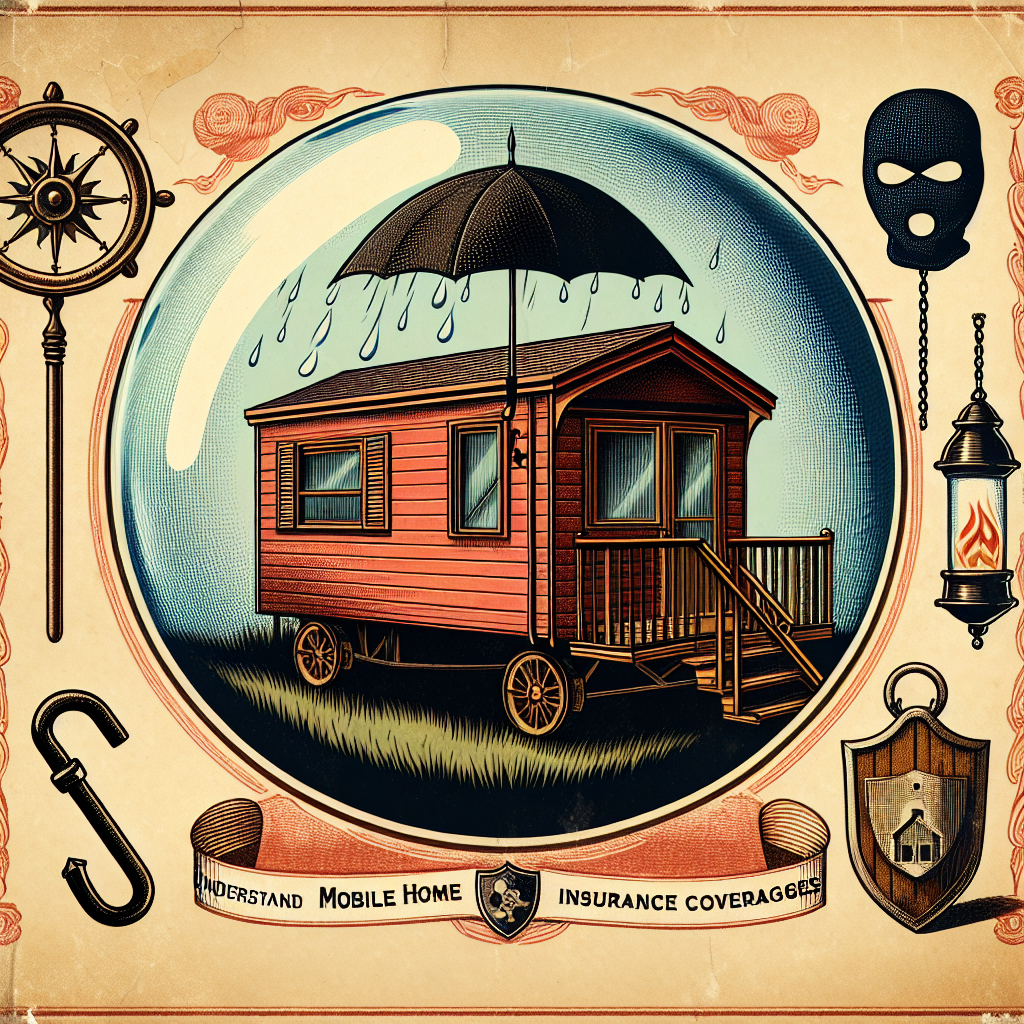Filed under Home Insurance on
Understanding Mobile Home Insurance Coverages

Mobile homes present a unique, cost-effective housing solution, blending affordability with flexibility. However, they come with specific insurance needs. Understanding mobile home insurance coverages is crucial for safeguarding your investment, ensuring peace of mind, and preparing for the unexpected. In this article, we delve into the essentials of mobile home insurance, explore different coverage options, and provide insights to help you make informed decisions.
What is Mobile Home Insurance?
Mobile home insurance, akin to traditional homeowners insurance, protects your property against various risks. Unlike conventional home insurance, it is tailored to address the unique challenges and structural differences of mobile homes, ensuring comprehensive protection. Understanding mobile home insurance coverages involves evaluating the specific risks associated with mobile homes, such as weather-related damages, theft, and liability issues.
Core Components of Mobile Home Insurance Coverage
Mobile home insurance policies typically encompass several essential coverages, each playing a pivotal role in safeguarding your investment. Below, we break down these core components for a deeper understanding.
1. Dwelling Coverage
Dwelling coverage protects the physical structure of your mobile home against perils like fire, wind, and hail. It ensures the cost of repairs or rebuilding is covered, up to the policy limit. Importantly, understanding mobile home insurance coverages involves recognizing how policy limits are determined, typically based on the home's replacement cost.
2. Personal Property Coverage
This component covers personal belongings within your mobile home, such as furniture, electronics, and clothing. In the event of theft, fire, or other covered perils, personal property coverage ensures reimbursement, allowing you to replace essential items swiftly.
3. Liability Coverage
Liability coverage safeguards you from financial loss if someone is injured on your property. It covers legal expenses and medical bills in case of an accident, ensuring you're not left vulnerable to costly lawsuits.
4. Loss of Use Coverage
If your mobile home becomes uninhabitable due to a covered peril, loss of use coverage helps cover additional living expenses, such as hotel bills and dining costs, while repairs are underway.
Additional Coverages to Consider
Beyond the foundational elements, understanding mobile home insurance coverages entails exploring optional add-ons that can enhance your protection.
1. Add-on Structure Coverage
This optional coverage protects structures attached to your mobile home, such as decks, porches, or sheds. These elements often require separate coverage due to differing construction standards.
2. Flood Insurance
Standard mobile home insurance policies typically exclude flood damage. Given the susceptibility of mobile homes to water-related issues, securing separate flood insurance can be a wise investment.
3. Replacement Cost Coverage
Unlike actual cash value coverage, which factors in depreciation, replacement cost coverage ensures full reimbursement for repairs or replacements, reflecting current market prices.
Factors Influencing Mobile Home Insurance Premiums
Several variables influence the cost of your mobile home insurance, and understanding mobile home insurance coverages involves recognizing these factors:
- Location: Areas prone to natural disasters may attract higher premiums.
- Age and Condition: Older or poorly maintained homes may incur higher costs due to increased risk of damage.
- Security Features: Homes equipped with security systems often qualify for discounted rates.
- Claims History: A history of frequent claims can elevate your premium.
Industry Trends and Expert Insights
According to recent industry reports, the mobile home insurance market is evolving, driven by technological advancements and climate change. Smart home technology plays an increasingly pivotal role, with insurers offering discounts for homes utilizing these systems.
Experts also highlight the growing importance of customization. As consumer awareness grows, more policyholders are tailoring their insurance plans to align with specific needs, emphasizing the value of understanding mobile home insurance coverages.
Steps to Choose the Right Insurance Policy
Choosing the right mobile home insurance entails more than just understanding mobile home insurance coverages. It requires careful evaluation and strategic planning.
- Assess Your Needs: Consider your location, lifestyle, and the value of your belongings to determine necessary coverages.
- Compare Quotes: Obtain quotes from multiple insurers to identify competitive rates and comprehensive coverage options.
- Review Policy Details: Pay close attention to exclusions, deductibles, and limits to avoid surprises at claim time.
- Seek Professional Advice: Consult with insurance agents or brokers, leveraging their expertise to make informed decisions.
Common Myths About Mobile Home Insurance
Misconceptions about mobile home insurance can lead to inadequate coverage or higher costs. Let's debunk some frequent myths:
1. Mobile Homes Are Harder to Insure
While they have unique risks, mobile homes are not significantly harder to insure than traditional homes. Specialized policies cater specifically to these needs, making coverage accessible and straightforward.
2. Comprehensive Coverage is Unnecessary
Skipping certain coverages might reduce premiums, but it can leave your investment vulnerable. Comprehensive coverage ensures robust protection against a wide array of risks.
3. All Mobile Home Insurance is the Same
Policies vary significantly in terms of coverages, exclusions, and limits. Understanding mobile home insurance coverages allows you to select a policy that best suits your unique needs.
Conclusion
Understanding mobile home insurance coverages is essential for protecting one of your most significant assets. By exploring the key components of insurance policies, recognizing influencing factors, and debunking common myths, you can confidently select a policy that provides comprehensive protection.
Stay informed about industry trends and leverage expert insights to ensure your mobile home remains a safe, secure, and economical living solution for years to come. Prioritize thorough research and engage with professionals to maximize the benefits of your mobile home insurance policy.




